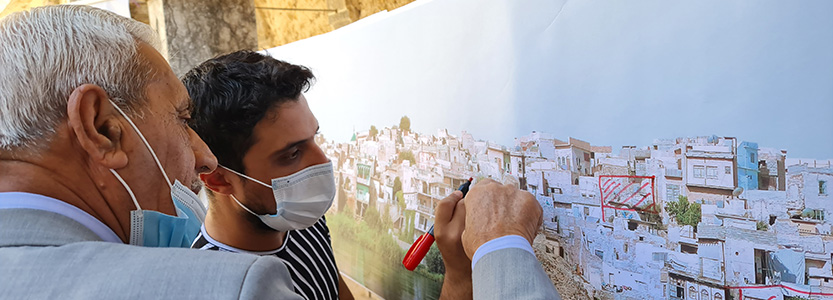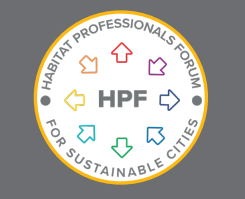Professional Associations and Development Institutes

About
The Habitat Professionals Forum (HPF) was established in 1999 under the auspices of UN-Habitat as an inter-disciplinary partnership of Human Settlement Professionals and UN-Habitat. It promotes the delivery of sustainable urbanization and equitable human settlements development. It is a voluntary affiliation of international associations of Human Settlements Professions which are democratic, non-profit, non-political, and non-governmental.
Specifically, the HPF:
- Provides expertise, knowledge, professional practices, and evidence-based solutions on urbanisation, which contributes to the implementation of the New Urban Agenda, the Sustainable Development Goals, and to sustainable urban development initiatives in general. The HPF has a specific focus on SDG 11, to make cities and human settlements inclusive, safe, resilient, and sustainable, through shared learning, advocacy and awareness-raising, training, and evaluation.
- Promotes the establishment of common values and ethical standards for professional practice in the field of human settlements.
- Works to enhance partnerships, exchange, and dialogue between and within the global network of Human Settlements Professionals and cross-sectoral alliances.
- Contributes to and advise on UN-Habitat policy initiatives, debates, and agendas.
- Advocates for:
- Professional capacity and learning in the field of human settlements;
- Development of the necessary knowledge, skills, and exchange of experience amongst professionals, policymakers, and elected officials;
- General understanding for the public to support of sustainable, resilient, safe, and inclusive urban development, especially integration into global, regional, subregional, and national development agendas; and
- Concrete actions around urbanisation issues with other UN-Habitat agenda partners, and to participate in the design, implementation, monitoring, and evaluation of UN-Habitat flagship programmes.
Membership
The HPF is currently composed of 26 international organizations with a broad membership that covers the globe. The professions represented include planning, architecture, engineering, surveying, housing, and water.
The HPF has a Chair and Co-Chair who are elected for two-year terms.
HPF Chair: Dr. Mona Rady
HPF Co-Chair: Eric Huybrechts
Ongoing Activities
The HPF regularly participates in and organizes international events addressing sustainable urbanization and equitable human settlements development, including:
- UN-Habitat World Urban Forum - Read more about the HPF at WUF11 in Katowice, Poland in 2022 here
- World Urban Campaign Urban Thinker Campuses
- UNFCCC COP27 - Read more about the HPF at COP 27 in Sharm El-Sheik, Egypt in 2022 here
The HPF 2022 Roadmap to Recovery
The HPF launched its Roadmap to Recovery at the World Urban Forum in June 2022. This is in response to the fact that current planning systems are not fit for purpose. Carrying on ‘business as usual’ will result in increased extreme poverty, unacceptable environmental risk, and underperforming economies. Both rich and poor nations have so much to lose if there is no change. Without change, we will continue to be knocked off course from meeting the UN’s Sustainable Development Goals and delivering the New Urban Agenda.
The Roadmap sets out a range of propositions to change the ways we plan and manage our cities and regions, and to make them fit for purpose in the Post-COVID World. If acted upon, these propositions will help align the separate and disparate actions of government at all levels and link policies to delivery mechanisms.
The Roadmap is underpinned by the following four key interventions:
- A renewed commitment to the New Urban Agenda
- Restoration of local trust in civic governance, and re-empower communities
- Tests of progress to bridge the current gap between policy rhetoric and practice and
- Scaled up capacity for more effective engagement, networking and service delivery.
The HPF calls upon all international bodies and networks to join in this critical and urgent endeavour to activate new concepts and best practices in human settlements and cities created by epidemics and other global crises, especially climate change. The HPF Partners commit to reviewing their own practices and policies, and increase their support for areas greatest need.
Please access a cover note here.
The full report can be read here.
A background report is available here.
The Habitat Professionals Forum Roadmap to a Just and Regenerative Recovery
The pandemic has been regressive in its impacts. The pressure to recover quickly by a return to "business as usual" would however be a huge error. COVID-19 has laid bare long-standing inequities faced by people around the world. Inequality in gender, race, and disability have come to the fore. Gaps in healthy life expectancy and opportunity have deepened. The recent progress that has been made in reducing poverty and in improving living conditions in the most vulnerable communities has been put risk.
An age of radical uncertainty has been created which calls out for a Roadmap that leads the way to just and regenerative recovery of cities, towns, and regions
In response to these concerns, HPF has set out a Roadmap for a Just and Regenerative Recovery. It sets out the key steps that now need to be taken in order to respond to, and recover from the pandemic, and to build resilience to future global shocks.
This is the Executive Summary of the HPF Roadmap to Recovery.
Statement on COVID-19
In 2021, the HPF released a Statement on Covid-19, wherein the members reinstated their wishes to recognize and extend gratitude to the front-line human settlement professionals who are protecting, supporting, and leading the world’s population during the COVID-19 crisis. With their expertise in built form, land use, economic development, social equity, and environmental stewardship, they are well-positioned to help rebuild and inclusively socialize local communities, settlements, cities, regions and territories during the COVID-19 recovery. The HPF stands for advocacy and knowledge exchange, raising awareness, solidarity and support among professionals in these difficult times, and it is deeply concerned by the growing impacts and unintended social and economic consequences of the COVID-19 pandemic crisis, which has revealed the fragility of urban and territorial systems and of our capacity for their management.




